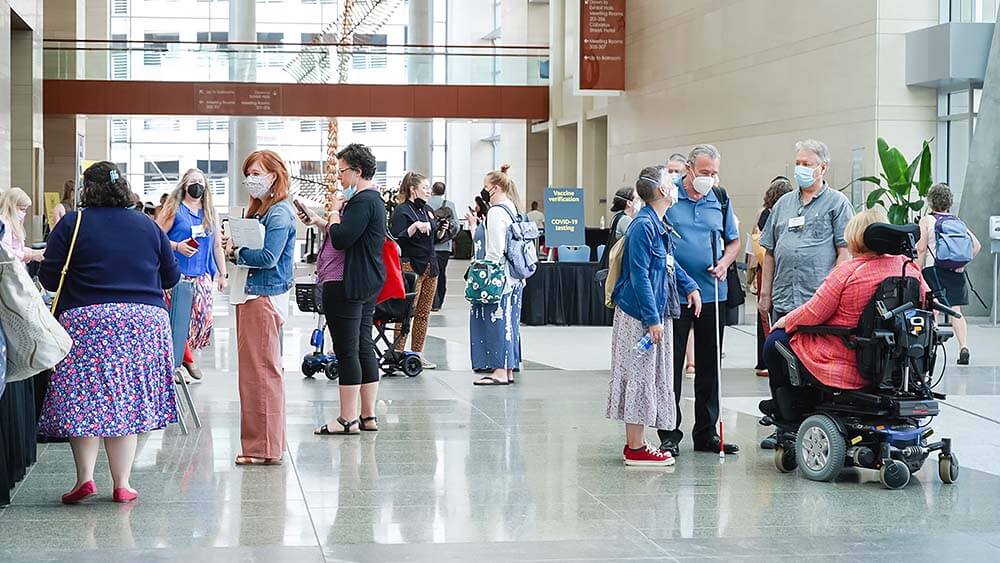
LEAD Conference attendees gather in the main lobby of the Raleigh Convention Center to verify COVID test results and vaccination status before the conference begins. The convention center worked to meet the accessibility needs of all the attendees.
Held early in August in Raleigh, the 2022 LEAD® Conference is part of the Kennedy Center’s Access/VSA International Network, a community based in Washington, D.C., that works to ensure that people with disabilities have access to and can actively participate in artistic and cultural endeavors. (VSA originally stood for Very Special Arts and since 2010 is known simply as VSA.) LEAD (Leadership Exchange in Arts and Disability) brings together professionals from a wide array of backgrounds who work to improve inclusivity and accessibility in arts venues, cultural institutions, and other similar settings around the world.
Off the bat, Raleigh made sense as a host destination for LEAD’s annual conference. The city has a thriving arts community and infrastructure — its nickname is “Smithsonian of the South.” And the Raleigh Convention Center (RCC) has made accessibility a major priority as one of only nine convention centers in the country to have earned KultureCity’s Sensory Inclusive Certification, which means both the facility itself and staff have met certain standards for accommodating people with autism and special sensory needs.
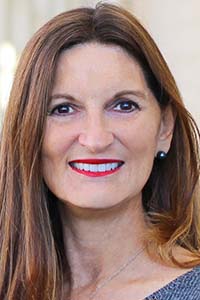
Kerry Painter
A significant portion of LEAD’s nearly 800 attendees included people with disabilities, as well as half of its presenters. That included unseen disabilities as well as physical, like impaired hearing and vision and limited mobility. Those diverse needs combined with the subject matter motivated the RCC team to level up their venue’s accessibility to a higher standard. That meant working closely with LEAD to walk through what attendees would require logistically but also experientially to ensure they could fully interact with every element of the conference.
“They kept [saying] this phrase when we were planning — ‘Nothing about us without us,’” said Kerry Painter, CEM, CMP, CFE, general manager and director of the Raleigh Convention and Performing Arts Complex. That phrase is commonly used by people with disabilities and organizations representing them as it pertains to policies that affect their lives and participation. “You really start to understand it as you see these accommodations happening that, when you don’t need them,” Painter said, “you just miss them.”
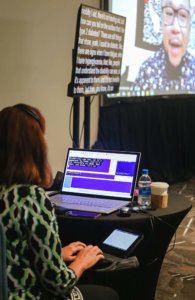
During the 2022 LEAD Conference, sessions included live transcriptions, sign language interpreters, and assistive listening devices for attendees with low vision or hearing.
Painter recalled one moment that crystallized the importance of this phrase. While learning about service dogs in training, an activation held in the RCC lobby during the LEAD conference, Painter was chatting with a planner as well as an attendee with impaired speech and hearing. About midway through the conversation, Painter noticed that the planner kept looking over the attendee’s shoulder at their phone — the attendee was using a speech-to-text app. “I realized that what I was saying was feeding into the phone, [the planner] was reading it, and the attendee was reading what the planner was saying into the phone,” said Painter. “It was just a moment where I realized there are so many tools and pieces that we don’t think about that make their day work so much better.”
A Fuller Experience for All
Making those tools and pieces available proved essential to the success of LEAD. In the lead-up to the conference, Betty Siegel, J.D., director of the Office of VSA and Accessibility at the Kennedy Center, and her team completed numerous site visits and walk-throughs to help the RCC team prepare the facility. Siegel also hosted accessibility training sessions for RCC staff as well as hospitality workers throughout Raleigh. That process showed the RCC team that ADA compliance is the bare minimum, and that gleaning insight from those with different accessibility needs is key. “Without that lens, you simply can’t move forward,” said Mara Craft, director of sales and marketing at the Raleigh Convention Center.
Siegel shared an example: “To be merely compliant with the law just means that you have a 32-inch-wide door” to accommodate wheelchairs, she said. “But do you have somebody who holds the door open and says, ‘Hello, welcome to this venue’? Do you have somebody who’s checking to make sure that the automatic door opener works every single time? Do you have someone inside who’s helping with wayfinding?” That extra effort and elevated level of customer service, she said, can go a long way in creating a more equitable experience for attendees with disabilities.
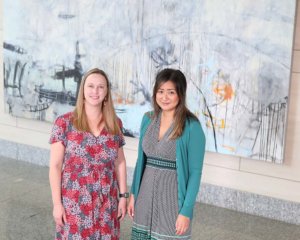
Mara Craft (left), director of sales and marketing, and Mary Deifer, marketing manager, from the Raleigh Convention Center, stand in front of artwork from the facility’s extensive permanent collection that has been made ADA compliant.
The team also relied on technology to support different components of LEAD’s program. For example, RCC worked with Raleigh Arts, a local arts organization, to curate on- and off-site art exhibits highlighting work by artists with disabilities. To ensure the exhibits would be accessible to all, they added QR codes linking to audio explanations (recorded by local theater performers for extra flair) and high-resolution images to make it easier for those with low vision to zoom in on the artwork. The RCC also worked with ablr, a company that specializes in helping businesses make their digital content ADA compliant and accessible, to improve its facility website — “because it looks great to us, but it doesn’t look great if you have low vision or color blindness,” Painter said.
In addition, some of the artwork featured “touch segments, so if you couldn’t see the butterfly exhibit on the wall you could touch the butterfly and understand what you weren’t able to see,” Painter said. This particular feature can help attendees with low vision experience the piece more fully as well as those with special sensory needs.
“Even if you don’t have a particular accessibility need, [these additions] make the collection better,” said Mary Deifer, the RCC’s marketing manager, who added that the RCC made these same amendments to its permanent on-site collection as well. “You learn more about the artist, you get to see in detail every brushstroke… you can notice things about the work that maybe you wouldn’t have otherwise. It’s good exhibit design.”
Jennifer N. Dienst is senior editor of Convene. Ascent is supported by the PCMA Foundation.
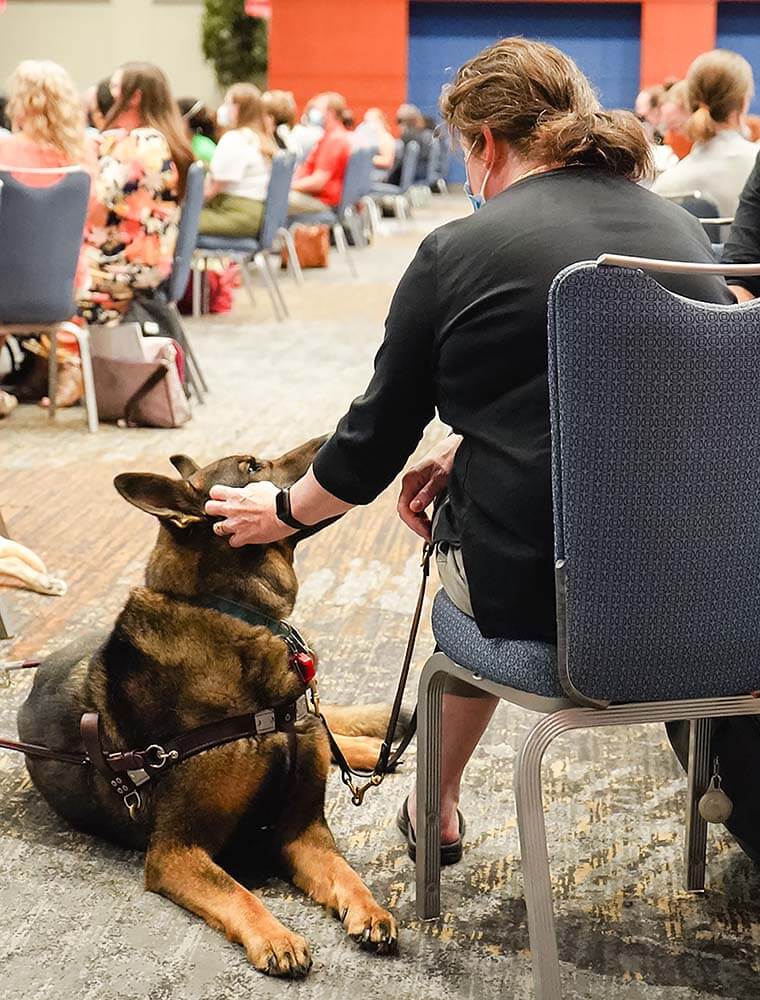
To make the experience of attendees with service dogs more comfortable while visiting the facility, the RCC staff set up dedicated spaces offering relief areas and water bowls.
Before the Blueprint
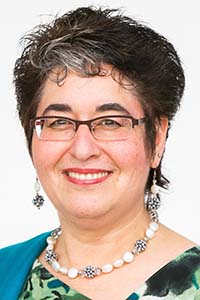
Betty Siegel
Ideally, accessibility in venue design starts long before there’s a venue to begin with. The Raleigh Convention Center, which is in the early stages of planning a renovation and expansion, made hiring Betty Siegel, director of VSA and accessibility for the Kennedy Center in Washington, D.C., one of the first steps in that process, so she could collaborate with the design team.
“Having those conversations before an architect puts pen to paper, that ensures that we have baked this into who we are, to be inclusive and accessible,” said the convention center’s Mary Deifer.
More About KultureCity
ON THE WEB
- For more details on the LEAD program and further resources on how to make facilities and programming more accessible to people with disabilities, visit The Kennedy Center website.
- For information, guidance, and training on implementing the ADA, visit the ADA National Network.
